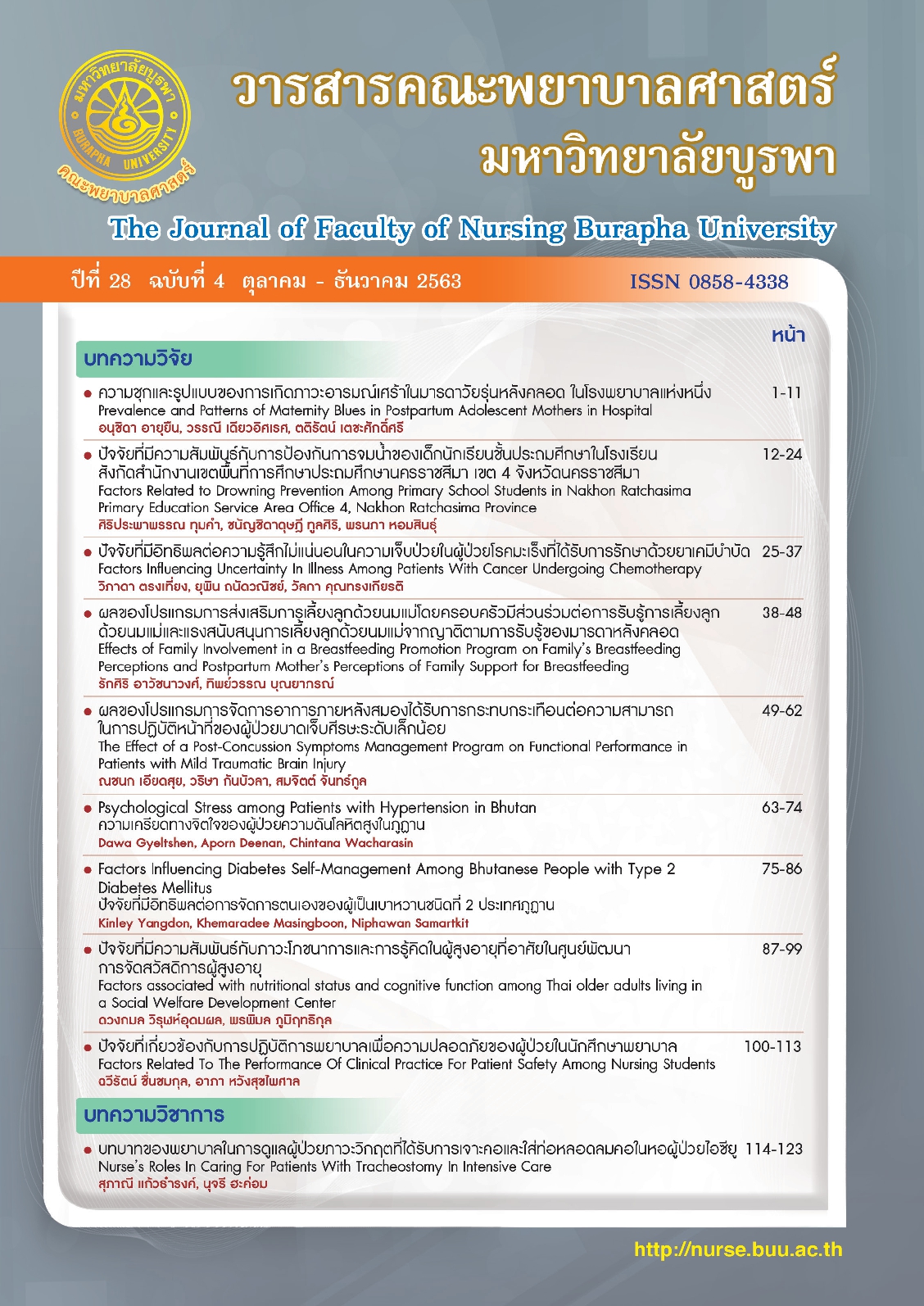Psychological Stress among Patients with Hypertension in Bhutan
Keywords:
family history, duration of diagnosis, blood pressure control, hypertensionAbstract
Understanding the relationship between psychological stress and blood pressure is a key in helping patients with hypertension control their blood pressure. The objective of this study was to examine the level of psychological stress among patients with hypertension and the differences in psychological stress level by gender, family history of hypertension, blood pressure control, and duration of hypertension. The descriptive design used simple random sampling to recruit 120 patients with hypertension at Jigme Dorji Wangchuk National Referral Hospital in Bhutan. Data were collected using a demographic data questionnaire and a perceived stress scale. Descriptive statistics and t-tests were used to analyze the data.
The results found that the majority (75.83%) of the sample reported moderate levels of psychological stress (x̄ =20.23, SD = 5.58). Only 12.50% of participants reported high psychological stress, and 11.67% reported low stress levels. The mean score of psychological stress was significantly different by duration of hypertension (more vs. less than 60 months [t118 = -4.21, p <.001]), controlled vs. uncontrolled blood pressure (t118 = -2.42, p <.05), and family history vs. no family history of hypertension (t118 = 2.18, p <.05). However, mean stress scores were not significantly different between the males and females (t118 = 1.85, p >.05). In conclusion, interventions for Bhutanese people with hypertension to manage psychological stress should be developed with a sensitivity to duration of diagnosis, family history, and ability to control blood pressure.
References
Chamik, T., Viswanathan, B., Gedeon, J., & Bovet, P. (2018). Associations between psychological stress and smoking, drinking, obesity, and high blood pressure in an upper middle‐income country in the African region. Stress and Health, 34(1), 93-101.
Cohen, S., Kamarck, T., & Mermelstein, R. (1983). A global measure of perceived stress. Journal of health and social behavior, 24(4),385-396.
Duwe, E. A., Holloway, B. M., Chin, J., & Morrow, D. G. (2018). Illness experience and illness representation among older adults with hypertension. Health Education Journal, 77(4), 412-429.
Gallo, L. C., Roesch, S. C., Fortmann, A. L., Carnethon, M. R., Penedo, F. J., Perreira, K., . . . Talavera, G. A. (2014). Associations of chronic stress burden, perceived stress, and traumatic stress with cardiovascular disease prevalence and risk factors in the HCHS/SOL sociocultural ancillary study. Psychosomatic Medicine, 76(6), 468-475.
Hsiao, C.-Y., Chang, C., & Chen, C.-D. (2012). An investigation on illness perception and adherence among hypertensive patients. The Kaohsiung journal of medical sciences, 28(8), 442-447.
Inoue, N. (2014). Stress and atherosclerotic cardiovascular disease. Journal of atherosclerosis and thrombosis, 21(5), 391-401.
Kibler, J. L., Joshi, K., & Ma, M. (2009). Hypertension in relation to posttraumatic stress disorder and depression in the US National Comorbidity Survey. Behavioral Medicine, 34(4), 125-132.
Kim, K.-B., Lee, J. H., Lee, Y., Noh, J.-W., & Kwon, Y. D. (2018). Factors affecting level of perceived stress by gender. The Journal of the Korea Contents Association, 18(3), 235-245.
Liu, M.-Y., Li, N., Li, W. A., & Khan, H. (2017). Association between psychosocial stress and hypertension: a systematic review and meta-analysis. Neurological research, 39(6), 573-580.
Malan, L., Schutte, C. E., Alkerwi, A. a., Stranges, S., & Malan, N. T. (2017). Hypothalamic-pituitary-adrenal-axis dysregulation and double product increases potentiate ischemic heart disease risk in a Black male cohort: the SABPA study. Hypertension Research, 40(6), 590-597.
Milas, G., Klarić, I. M., Malnar, A., Šupe‐Domić, D., & Slavich, G. M. (2019). Socioeconomic status, social‐cultural values, life stress, and health behaviors in a national sample of adolescents. Stress and Health, 35(2), 217-224.
O'Donnell, M. J., Chin, S. L., Rangarajan, S., Xavier, D., Liu, L., Zhang, H., . . . Agapay, S. (2016). Global and regional effects of potentially modifiable risk factors associated with acute stroke in 32 countries (INTERSTROKE): a case-control study. The Lancet, 388(10046), 761-775.
Richardson, S., Shaffer, J. A., Falzon, L., Krupka, D., Davidson, K. W., & Edmondson, D. (2012). Meta-analysis of perceived stress and its association with incident coronary heart disease. The American journal of cardiology, 110(12), 1711-1716.
Rothwell, P. M., Howard, S. C., Dolan, E., O'Brien, E., Dobson, J. E., Dahlöf, B., . . . Poulter, N. R. (2010). Prognostic significance of visit-to-visit variability, maximum systolic blood pressure, and episodic hypertension. The Lancet, 375(9718), 895-905.
Sadeghi, M., Alavi, M., Mohammadi, M., Roohafza, H., Mahmoodi, A., Visentin, D., . . . Cleary, M. (2019). Perceptions of illness as predictive factors for perceived stress in patients participating in a cardiac rehabilitation program. Nursing & health sciences. 21(4), 508-514.
Sarkar, A., Roy, D., Chauhan, M. M., Dave, P., Makwana, N. R., & Parmar, D. V. (2019). A lay epidemiological study on coexistent stress in hypertension: Its prevalence, risk factors, and implications in patients’ lives. Journal of Family Medicine and Primary Care, 8(3), 966-971.
Vasunilashorn, S., Lynch, S. M., Glei, D. A., Weinstein, M., & Goldman, N. (2015). Exposure to stressors and trajectories of perceived stress among older adults. Journals of Gerontology Series B: Psychological Sciences and Social Sciences, 70(2), 329-337.
Verma, R., & Ura, K. (2018). Gender differences in Gross National Happiness in Bhutan: abridged analysis of the GNH surveys. GNH: From Philosophy to Praxis, Proceedings of the sixth international conference on GNH, 4-6 November 2015, Paro, Bhutan, 196-247.
Wang, J., Ma, J. J., Liu, J., Zeng, D. D., Song, C., & Cao, Z. (2017). Prevalence and risk factors of comorbidities among hypertensive patients in China. International journal of medical sciences, 14(3), 201-212
World Health Organization (2019). Hypertension factsheet. Retrieved from https://www.who.int/news-room/fact-sheets/detail/hypertension
World Health Organization (2016). National survey for noncommunicable disease risk factors and mental health using WHO STEPS approach in Bhutan-2014. Retrieved from http://apps.who.int/iris/handle/10665/204659





